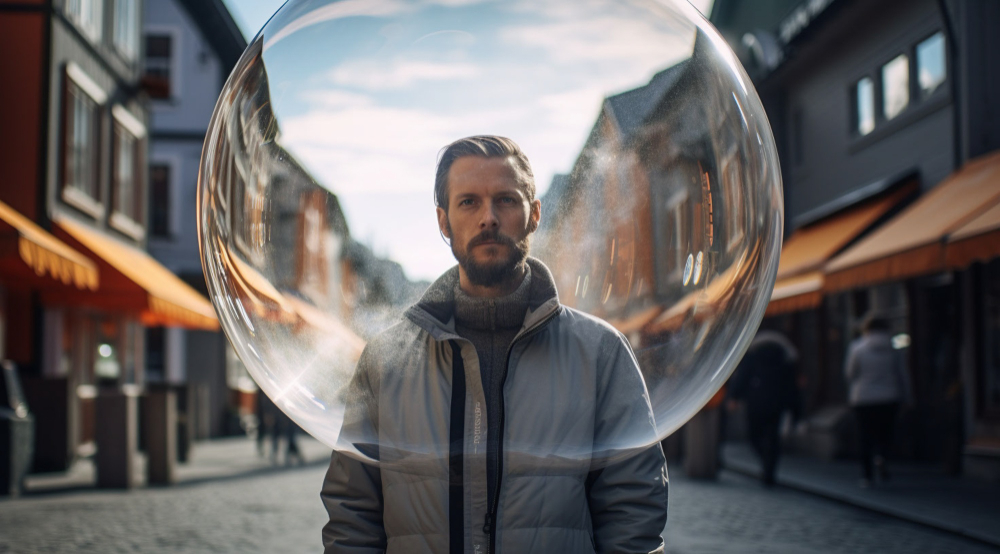I used to think being the guy who always said “yes” was a badge of honor. The reliable one. The problem-solver. The man who never let anyone down. But sitting there, scrolling through a calendar packed tighter than a subway car at rush hour, I had an uncomfortable realization: I’d become everyone’s go-to guy except my own.
The Hidden Cost of Being “That Guy”
Let’s be real for a minute. As men, we’re often conditioned to be providers, fixers, and solution-finders. From a young age, many of us learned that our value came from what we could do for others. Need something heavy moved? Call him. Computer acting up? He’ll figure it out. Extra shift at work? He never says no.
Research shows that when you say “no” to others, you are really saying “yes” to yourself, but somehow this simple concept feels revolutionary when you’ve spent years being everyone else’s safety net.
I didn’t realize how exhausted I was until I started paying attention to my energy levels. Every “sure, no problem” was like a small withdrawal from an account I never bothered to check the balance on. The constant availability, the automatic “yes” responses, the guilt when I even considered declining – it had all become so normal that I’d forgotten what it felt like to have genuine free time.
The breaking point came on a Tuesday. I’d agreed to help my sister move, promised to review a project for a colleague, committed to a networking event I had zero interest in attending, and somehow found myself volunteering to coach my nephew’s soccer team. All in the same week. When my wife asked if we could have a quiet dinner together, I realized I’d double-booked myself again.
That’s when it hit me: I wasn’t being helpful anymore. I was being a people-pleaser, and there’s a massive difference.
The “No” That Started Everything
My first intentional “no” was terrifying. A coworker asked if I could cover part of his presentation because he was “swamped.” Old me would have immediately said yes, probably stayed late to prep, and delivered someone else’s work while he took the credit. New me took a breath and said, “Sorry, I can’t help with that this time.”
The world didn’t end. He figured it out. Life went on.
But something incredible happened: I had an entire evening to myself. For the first time in months, I sat on my back porch with a beer, no agenda, no one needing anything from me. The quiet was almost uncomfortable at first – I kept checking my phone, expecting someone to need something. But as the minutes ticked by, something shifted.
I remembered what it felt like to just… be.
Learning the Art of Strategic Selfishness
Here’s what I discovered about saying “no” that nobody talks about: it’s not selfish – it’s strategic. Setting boundaries gives you control and can help improve self-confidence, but more than that, it allows you to show up as your best self for the things that actually matter.
When I started getting selective about my commitments, something weird happened. The quality of my relationships improved. Instead of being spread thin across a dozen half-hearted interactions, I could be fully present for fewer, more meaningful ones. My wife noticed I was more engaged during our conversations. My kids got a dad who wasn’t constantly distracted by the mental to-do list of favors I’d agreed to do for other people.
I learned to distinguish between helping and enabling. There’s a difference between being there for someone in genuine need and being someone’s default solution because they can’t be bothered to figure things out themselves.
The Quiet Revolution in My Calendar
The most surprising thing about embracing “no” wasn’t the pushback from others (though there was some). It was discovering how much mental space I’d been giving to commitments I didn’t care about. Boundaries are defined rules or limits that someone establishes to protect their security and wellbeing around others, and I started to understand this on a visceral level.
My calendar got quieter, but my life got richer. Those empty blocks of time that used to make me feel guilty? They became sacred. Time to think, to plan, to pursue interests that had been gathering dust. Time to be spontaneous with my family. Time to actually finish projects instead of perpetually starting new ones.
I rediscovered hobbies I’d abandoned years ago. Remember that guitar collecting dust in the corner? I started playing again. That book I’d been meaning to read for two years? Finally finished it. The home gym equipment that had become an expensive clothing rack? Back in action.
The Ripple Effect Nobody Warned Me About
Here’s where it gets interesting: when you stop being everyone’s default “yes” person, you force others to become more resourceful. That colleague who always needed help with presentations? Turns out he’s perfectly capable when he doesn’t have a safety net. My neighbor figured out how to maintain his own lawnmower. My sister discovered she could hire movers and it wasn’t that expensive.
I wasn’t enabling their growth by always swooping in to save the day. I was preventing it.
Mental health experts note that without boundaries, “your self-esteem and identity can be impacted, and you build resentment toward others because of an inability to advocate for yourself”. Looking back, I can see how much resentment I was carrying without even realizing it. Every “yes” that should have been a “no” was a small betrayal of my own needs and priorities.
The Pushback (And How to Handle It)
Let’s be honest – not everyone was thrilled with my newfound selectivity. Some people who’d gotten used to my constant availability were confused, even a little irritated. I got the occasional guilt trip: “You used to be so helpful” or “I guess you’re too busy for us now.”
These comments stung at first, but they also revealed something important: some relationships were built entirely on my usefulness rather than genuine connection. The people who mattered – my family, close friends, people who reciprocated – understood and respected my boundaries. The ones who pushed back? Well, that told me everything I needed to know about where I stood with them.
I learned to respond to guilt trips with compassion but firmness: “I care about you, but I can’t take this on right now” or “I hope you find a good solution” became my go-to phrases. No elaborate justifications, no over-apologizing – just honest, direct communication.
The Practical Side of Saying No
If you’re thinking about making this shift, here are some strategies that made it easier for me:
The 24-hour rule: Unless it’s a genuine emergency, I give myself a day before committing to anything. This simple pause prevents those automatic “yes” responses that I’d later regret.
The energy audit: Before agreeing to something, I ask myself: “Will this energize me or drain me?” Life’s too short to fill it with energy vampires.
The replacement test: For every new commitment, I ask what I’d have to give up. That family dinner? The workout I’ve been skipping? The personal project that matters to me? Suddenly, the true cost becomes clear.
Scripts that work: “Let me check my calendar and get back to you,” “That doesn’t work for me,” and “I’m not available for that” became powerful tools. No explanation required.
What Quiet Actually Sounds Like
These days, my life has a different rhythm. There are spaces between commitments where I can breathe. My evenings aren’t booked solid with obligations I don’t care about. My weekends have room for the unexpected – a spontaneous hike, an impromptu dinner with friends, or simply the luxury of having nowhere to be.
The quiet isn’t empty – it’s full of possibilities. It’s the space where creativity happens, where relationships deepen, where you remember who you are when you’re not performing the role of everyone’s savior.
I still help people. I still show up for the things that matter. But now I do it from a place of choice rather than compulsion, energy rather than depletion. The help I offer is more valuable because it’s intentional, not reflexive.
The Man I Didn’t Know I Could Be
Learning to say “no” taught me something crucial: I’m not responsible for solving everyone else’s problems, managing their emotions, or making their lives easier at the expense of my own. This isn’t callousness – it’s clarity.
I’m a better husband because I’m not constantly overwhelmed by other people’s demands. I’m a better father because I’m present instead of preoccupied. I’m a better friend because my friendship is chosen, not obligated.
The quiet in my life now isn’t the absence of connection – it’s the presence of intention. Every “yes” means something because it’s balanced by the power to say “no.” Every commitment has weight because it’s chosen consciously.
If you’re reading this while checking your phone for the third time, wondering how you’re going to fit one more thing into your already packed schedule, I want you to know: it doesn’t have to be this way. You don’t have to be everyone’s go-to guy to be valuable. You don’t have to say yes to everything to be a good person.
Sometimes the most powerful thing you can do is nothing at all.
The Bottom Line
Here’s what I wish someone had told me years ago: your time, energy, and peace of mind are not renewable resources. Every automatic “yes” is a vote for the life you currently have. Every conscious “no” is a vote for the life you want to create.
The quiet that comes from living intentionally isn’t lonely – it’s liberating. It’s the sound of a life that belongs to you again, filled with choices that align with your values instead of other people’s expectations.
Start small. Pick one thing this week that you don’t want to do and politely decline. Notice how the world keeps spinning. Notice how you feel when that time becomes yours again.
Your future self – the one who’s learned to protect his energy, prioritize his values, and show up fully for what matters – will thank you for it.
Trust me, the quiet is exactly what you’ve been missing.

Disclaimer: This article is intended for informational and lifestyle purposes only and should not be considered professional, medical, or psychological advice. The views expressed are based on personal experiences and general research about lifestyle choices and boundary-setting. Individual experiences may vary, and readers should use their own judgment when implementing any suggestions. If you’re experiencing significant stress or mental health concerns, please consult with qualified professionals in your area. The author and publisher are not responsible for any actions taken based on the information provided in this article.
Sources: Information in this article draws from research published by UC Davis Health, TIME magazine, the Depression and Bipolar Support Alliance, and various lifestyle and wellness publications focused on boundary-setting and personal development.



